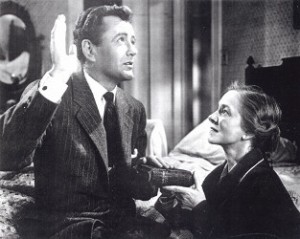STUDIO: Olive Films | DIRECTOR: Leo McCarey | CAST: Helen Hayes, Van Heflin, Robert Walker, Dean Jagger, Richard Jaeckel
BLU-RAY & DVD RELEASE DATE: 8/21/2012 | PRICE: DVD $24.95, Blu-ray $29.95
BONUSES: none
SPECS: NR | 122 min. | Drama | 1.37:1 fullscreen | mono
My Son John, a Cold War spy melodrama from 1952, is a film which, over the years, has been more talked about than viewed. One of the stars, Robert Walker, died during production; a death rumored to be a suicide and, in keeping with Hollywood’s romance of the blacklist, somehow connected with his role of a Communist.
The film itself, directed by Leo McCarey, who won an Oscar for the sentimental classic Going My Way, has attained the status of an anti-Communist Reefer Madness.
The story is simple: A small-town, deeply religious American family with two sons away at war is visited by their eldest son John (Walker), a brilliant government official. There’s always been tension between John with his leftist bromides, and his legionnaire father (Dean Jagger, Private Hell 36), while the mother (Helen Hayes, Airport) runs interference. When an FBI agent (Van Heflin, Shane) turns up, they begin to realize those bromides might indicate something more sinister.
For the acting alone, My Son John–which features four stars of brilliant film and theater pedigree–deserves to be seen: Walker, fresh off his iconic performance in Hitchcock’s Strangers on a Train, is dazzling in his sarcasm, his contempt barely masked by charm. Jagger’s fevered alcohol-fueled responses to his son’s provocations make him seem at first the irrational one. Helen Hayes is seen here following her greatest stage triumphs and before her pixilated-aunt mannerisms could be phoned in for a paycheck. And what a pleasure to watch her sensitive, detailed performance as a woman pushed to the breaking point. Van Heflin’s soothing demeanor is at the service of a rock-like steadiness as he burrows into a family’s secret. The scenes where he interviews Hayes are like two virtuoso musicians playing a due. And nobody could snap a fedora into place like Van Heflin.
The film does seem at times overwrought, perhaps due to the close confines of the home where much of the action takes place. Also, Walker’s death created an imbalance in the storytelling and much of the final reel unfolds using footage from Strangers on a Train. In several scenes, he is seen mouthing inaudibly at the same phone booth as other characters fill in the conversation. And a climactic speech is given by a tape recorder (with a heavenly light shining on it).
Another issue touched on is the post-war zeal to medicate women. A kindly doctor pushes Hayes to take pills for “a woman at your time in life.” John advocates the pills; his mother chooses to rely on her faith. In a tragic irony, Walker’s death was not a suicide, but an allergic reaction to prescription drugs.
As for the film’s rep as over-the-top propaganda, well, after several years of mob assaults on private property and state capitols, denigration of personal achievement, and an economy paralyzed by Statist bureaucrats, McCarey seems less an avuncular alarmist than a patient professor imparting hard-won truths. Never forget, in the twentieth century, John’s ideology was responsible for more deaths in peacetime than all the wars combined, while his family’s Catholic church bravely opposed it and helped free millions from its shackles.
Perhaps the most chilling and timely moment comes when Hayes denounces her son’s beliefs as “despair masquerading as hope” (and change?).
|
Buy or Rent My Son John
|
|||
|---|---|---|---|
DVD |
 |
 DVD | Blu-ray DVD | Blu-ray |
|

Leave a Reply